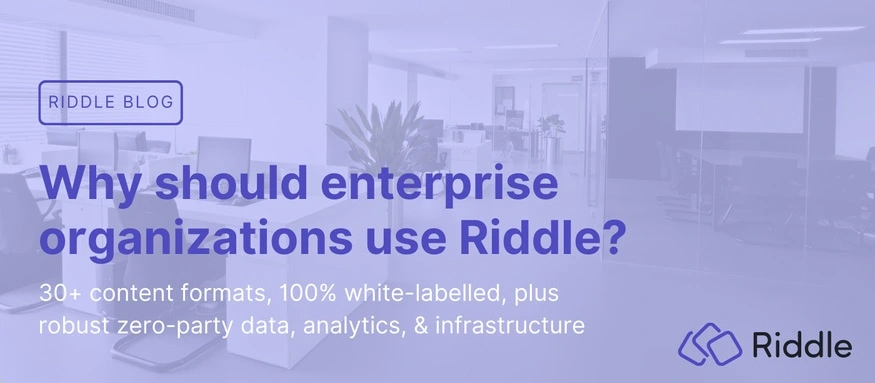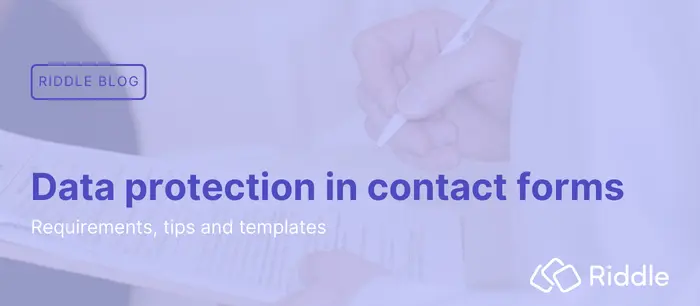Quizzes have always been and remain one of the most popular interactive formats on the web, yet they are still surprisingly an under-appreciated gem for email lead generation.
Why? Quizzes outperform any other method for email collection – period. Read on to discover the psychology behind quizzes and why they outperform all other lead-generation methods.
Introduction
Quizzes are everywhere. They are used in competitions, raffles, offline in pubs and print magazines, and on websites to engage users and collect emails. While traditional methods to collect user information like names and emails yield fill-out rates of 0.5 to 5% for high-performing pop-ups, quizzes get 30% to 50% completion rates. In this post, we will explore why quizzes work so well.
The appeal of online quizzes
Surveys and forms are less successful than quizzes when collecting information. There is a very simple explanation for this. You need an incentive to fill out a form or survey. These are not completed for the benefit of the audience, but for the benefit of whoever created the survey, so the user expects gratification for filling it out.
A quiz, on the other hand, is the incentive itself, taken solely for the user’s enjoyment. The gratification is the quiz result. It shows that the user is an expert, and the result can be used to shine in front of friends by sharing it on social.
The results might even be comically bad, which can also be used to share with friends and make fun of yourself – “I thought I knew baseball inside out. Then I scored 10% on a rules quiz, which I believe technically makes me a cricket fan.”
The role of curiosity and instant gratification
Quizzes challenge readers, and who doesn’t like a good challenge?
It’s hard not to start a quiz on your favorite topic, sport, or hobby. As you can take them in total privacy, they provide a safe space to learn more about yourself and your skills on the subject matter. And if they are personality quizzes with no right or wrong answers, they can also provide deep insights into the psyche of the quiz taker. A psychiatrist might create seemingly mundane questions such as “What color fits your style?” to determine your level of depression, for example.
As the internet allows for relative anonymity when taking quizzes, users will lose some of their inhabitations when taking quizzes on sensitive topics. Furthermore, quiz makers like Riddle.com, which work without using cookies or trackers, will increase the feeling of safety needed to take a quiz on a more personal topic. When picking a quiz maker, use tools that do not track your quiz takers in any way.
The power of personalization
A good quiz maker will let you use the user’s answers and data from form fields to personalize the quiz result (e.g. ‘Nice work, Bob – you got 95% on our weekly news quiz!’.
Even better, you will be able to continue the conversation – sending the quiz results send it to each user via email (maybe even with additional, valuable information in the email). Personalizing results will make the quiz much more relevant for the quiz taker and increase the likelihood of sharing the result with others via email or social networks.
The exchange: value for information and the habit of entering data
The extremely high lead form completion rates that we see in millions of quizzes on the Riddle.com platform can be explained by a simple psychological fact. Users that are willingly filling out data and answer questions that truly interest them for 3 to 5 minutes will feel much more at ease about filling out yet another form field with their name and email. It is a process that comes naturally.
Our experiments show that even if the form is skippable, the completion rates do not drop by much.
Compare that with an intrusive (and seriously annoying) pop-up. Often shown after a user has spent a certain amount of time on a website or has scrolled to a defined scroll depth, these get completion rates of just 3% – quiz lead forms are at least 10X more effective (check out this and other key statistics our annual quiz marketing report).
Why? Pop-ups are intrusive and a distraction, while an integrated form is a natural part of the quiz process.
Building quiz lead funnels with the ASK Method (from Ryan Levesque)
The “ASK Method”, developed by Ryan Levesque, is a marketing approach that emphasizes understanding customers’ specific needs through strategic questioning. This method involves guiding potential customers through surveys and quizzes to gather insights into their preferences and challenges. By segmenting the audience based on their responses, businesses can deliver personalized solutions and messages, enhancing engagement and conversion rates.
If you are unfamiliar with the “ASK Method”, watch this YouTube Video.
Riddle’s quiz maker is a natural fit for the “ASK” approach.
- Imagine you run a bookshop.
- Your goal is to provide your customers with suitable book recommendations.
- You set up a two step process:
- Step 1: a one-question poll where the user picks their favorite genre.
- Step 2: a follow-up personality quiz to learn more about that person’s reading habits.
Based on the user’s specific results, you send them to a page full of custom reading recommendations.
With Riddle this is a simple and intuitive task that won’t take much time, with the additional benefit of effortlessly collecting leads.
How to use Riddle with the “ASK Method”
To use our quiz creator with the “ASK Method” to segment leads, you’ll need to be able to match the lead with their quiz answers. If your country has restrictions on this, Riddle offers a switch to allow your users to opt out of sending their quiz data along with their lead information.
Use a built-in lead form, integrated in your quiz: Leads are collected by Riddle, which you can send to Google Docs or download them in a XLSX or CSV format. You will get all the quiz answers and quiz results combined with the lead data in your XLSX file.
You can send all your leads via an integration or Zapier to your own server or your CRM.
Benefit from branching logic to customize your content even further
You can use conditional quiz result logic with Riddle to send users to fully customized result pages. Back to our bookshop example: You send your customers to specific landing pages via a CTA button on your result pages so they’re ready to find and buy their book.
As well for results, branching logic for quiz questions is another possibility. Inspired by the classic ‘Choose your own adventure’ style books, each quiz taker will get a unique set of questions based on their previous answer(s), eventually leading them to your product recommendations, based on these answers.
Conclusion
The enduring appeal of online quizzes lies in their ability to engage users through challenge, curiosity, and instant gratification. Unlike traditional forms and surveys, quizzes offer an enjoyable, personalized experience that naturally encourages participation and information sharing. The psychology behind this is simple: People enjoy discovering more about themselves and showcasing their knowledge or personality traits, whether they excel or falter in the quiz.
Quizzes’ interactive and rewarding nature makes them powerful tools for email lead generation. By seamlessly integrating email collection into a fun and engaging activity, quizzes can achieve completion rates that are significantly higher than conventional methods. Users willingly provide their information as a natural extension of their quiz-taking experience, resulting in higher engagement and more effective lead generation.
Understanding the psychology behind why people love taking quizzes and giving their email addresses can help businesses and marketers leverage this interactive format to build stronger connections with their audience and achieve their marketing goals more efficiently.
Further reading
Wired Magazine: Quizzes tap into people’s curiosity and desire for self-discovery.
Psychological research supports this, showing that people have an innate drive to learn about themselves. As MIT psychologist Sherry Turkle explains, “People want a read on the self, an order to it. They’ll use a [body] sensor to get the number; they’ll use a quiz to get the number. It gives people something to look at, an object to think with.”
Positive Psychology: Personality Assessments – 10 best inventories, tests & methods.
Study: What works better for lead generation: Quizzes or pop-ups?



